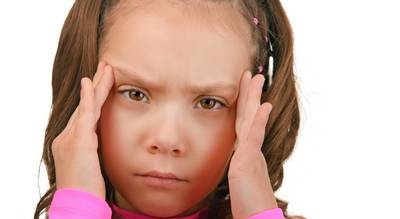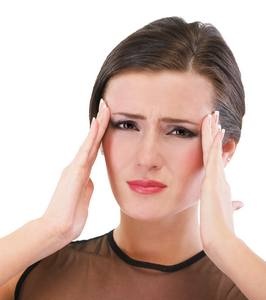|
 Headache is one of the most common health conditions, with about 15 percent of us taking pain medications for headaches at any given time. People of any age can be affected, but people between the ages of 25 and 44 are more likely to report headaches. Headache is one of the most common health conditions, with about 15 percent of us taking pain medications for headaches at any given time. People of any age can be affected, but people between the ages of 25 and 44 are more likely to report headaches.
There are different types of headaches and many different reasons, which explains why this condition is so common. Most headaches have more than one factor. Some of the most common triggers for headaches are lifestyle-related, such as poor diet, stress, muscle tension, and lack of exercise. Serious underlying disorders, such as brain tumors, rarely cause headaches, although persistent headaches should always be investigated by a doctor.
Pain receptors and headache
You feel pain, inflamed or irritated various structures of the head. These structures include:
1. Muscles and scalp.
2. Nerves of the head and neck.
3. Arteries leading to the brain.
4. Membranes of the ear, nose and throat.
5. Sinuses, which are air-filled cavities inside the head that form part of the respiratory system.
The sensation of pain can also mean that pain that occurs in one area can transmit the sensation of pain to an adjacent area. An example is the headache association due to a sore neck.
Headache causes
Anything that stimulates pain receptors in a person's head or neck causes headaches, including:
1. Stress.
 2. Muscle tension. 2. Muscle tension.
3. Problems with teeth or jaws.
4. Infections.
5. Diet.
6. Eye problems.
7. Hormonal influences.
8. Medicines.
9. Hearing, nose or throat problems.
10. Disorders of the nervous system.
11. Injury to the head, neck or spine.
12. High CD.
13. Poor posture - puts unnecessary stress on the muscles of the back and neck.
14. Hangover from alcohol or drug abuse.
15. Temperature - extremes of heat or cold.
16. Dehydration - affects blood pressure.
17. Noise - especially loud sounds.
18. Arthritis.
19. Meningitis.
Infection-related headache
Many infections of the nose, throat, and ear can cause headaches. Depending on the disorder, treatment may include medications such as antibiotics, decongestants, or antihistamines. Persistent problems such as chronic tonsillitis may require surgery.
4. Headache caused by diet and nutrition.
According to some studies, what we eat and when we eat can play a significant role in headaches. Various diet-related reasons include:
1. Fluctuations in blood sugar, which can lead to spasm of the arteries in the head.
2. Removal of caffeine, usually caused by regular and excessive consumption of coffee or tea.
3. Food additives such as monosodium glutamate.
Chemicals in food such as amines
Certain other foods can cause headaches in susceptible people. It is important to seek professional help. Self-diagnosis of food sensitivity can result in unnecessary diets that may not work.
It is a good idea to keep a diary of what you ate or drank 24 hours before your headache. This provides a clue to the triggers of food-related headaches.
Medications and headache
The drugs are designed for a specific target in the body, such as a diseased organ. However, they can also affect other areas of the body.Unwanted side effects or side reactions are possible with all drugs, including prescription and over-the-counter medicines, herbal remedies, and vitamin tablets.
 Oral contraceptives (“pills”) can cause headaches as an unwanted side effect. HRT, also known as hormone therapy, makes headaches worse for some women. Certain diabetes medications can also make headaches worse. Oral contraceptives (“pills”) can cause headaches as an unwanted side effect. HRT, also known as hormone therapy, makes headaches worse for some women. Certain diabetes medications can also make headaches worse.
Suggestions for reducing the risk of medication-induced headaches include:
1. Following label dosage directions.
2. Do not mix medicines with alcohol.
3. Avoid dependence on pain relievers.
4. Report any side effects or unusual symptoms immediately.
If you think medications may be giving you persistent headaches, it is important to consult your doctor. In many cases, a different medication can be prescribed.
Pain medications and rebound headaches
There are many causes of recurrent headache, and several factors work in combination. Instead of looking at the causes, it may seem easier to take pain relievers such as aspirin. However, taking more than three doses per week can make your problem worse.
Ear, Nose, Throat Disorders and Headache
Hearing, nose, and throat disorders that can cause recurrent headache include:
1. Sinus problems - caused by infection, colds, flu, or allergic reactions such as hay fever.
2. Labyrinthitis is a general term for any type of inner ear inflammation.
3. Infections - ear, nose or throat caused by bacteria or viruses.
4. Trauma - such as a blow to the ear or perforation of the eardrum.
5. Hay fever - when the immune system overreacts to irritants such as pollen.
6. Tonsillitis is an infection most often caused by the bacteria streptococcus.
Nervous system and headache
Irritated, inflamed, or damaged nerves can lead to headaches. Reasons may include:
1. Hemorrhages - some health conditions such as hypertension and diabetes, can damage blood vessels.
2. Infections such as meningitis, which is an inflammation of the membranes that line the brain and spinal cord.
3. Nerve damage - can be caused, for example, by a vitamin deficiency or an injury to the head or neck.
4. Very rarely, swelling.
Neurologists specialize in nerve and brain disorders. Rarely are headaches caused by serious problems such as a brain tumor, but this must be ruled out with a medical evaluation. Typically, you will only be referred to a neurologist after all other causes of chronic headache have been investigated and treated. Some neurological tests include CT scans and MRI scans. Treatment depends on the disorder.
Headache diagnostics
A headache can be caused by many factors that work together. That is why you need professional advice on examining and correctly diagnosing the specific factors associated with your recurring headache. In some cases, headaches are a warning of more serious problems. Tests may include scans, vision tests, and sinus x-rays.
 Factors to consider when diagnosing a headache include: Factors to consider when diagnosing a headache include:
1. Location of pain, for example, around one eye or over the scalp.
2. The degree of pain.
3. The duration of the headache.
4. Other symptoms such as blurred vision or neck pain.
5. Factors that make the headache worse, such as certain foods.
6. Factors that improve the headache, such as massage.
Headache treatment
Successful treatment of persistent headache requires a combined approach that considers all triggers. Ask your doctor or healthcare professional for help with treatment.Your doctor may refer you to appropriate specialists such as ear, nose and throat specialists, neuropathologists, optometrists, and physical therapists.
Treatment for a headache depends on the cause. Some of the various treatments include:
1. OTC pain relievers such as aspirin or paracetamol.
2. Relaxation techniques such as massage.
3. Changing your diet.
4. Alternative treatments such as acupuncture or chiropractic.
5. Stress management.
6. Eliminate any drugs that cause headaches as a side effect, such as birth control pills.
7. Medicines acting on the arteries.
8. Treating any underlying disorder such as high blood pressure, neck problems, or jaw problems.
Povin I.A.
|
 Headache is one of the most common health conditions, with about 15 percent of us taking pain medications for headaches at any given time. People of any age can be affected, but people between the ages of 25 and 44 are more likely to report headaches.
Headache is one of the most common health conditions, with about 15 percent of us taking pain medications for headaches at any given time. People of any age can be affected, but people between the ages of 25 and 44 are more likely to report headaches. 2. Muscle tension.
2. Muscle tension. Oral contraceptives (“pills”) can cause headaches as an unwanted side effect. HRT, also known as hormone therapy, makes headaches worse for some women. Certain diabetes medications can also make headaches worse.
Oral contraceptives (“pills”) can cause headaches as an unwanted side effect. HRT, also known as hormone therapy, makes headaches worse for some women. Certain diabetes medications can also make headaches worse.









